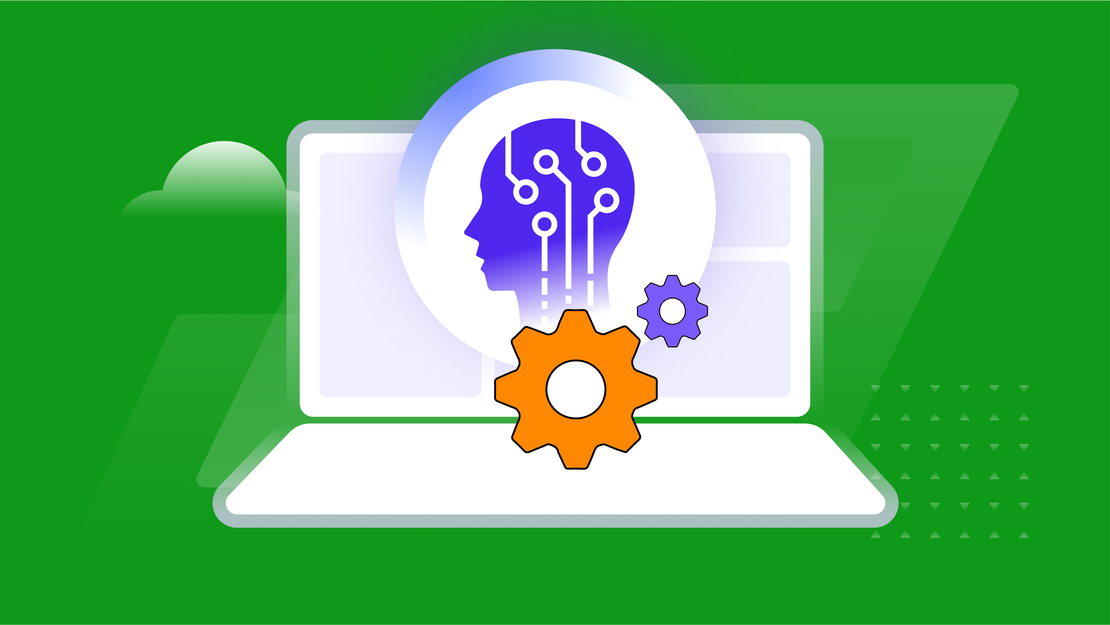Machine Learning: What Is It and How Do You Use It?
What is machine learning? How does it differ from AI and deep learning? And most importantly, how can you use it to work more efficiently, save time, and make better decisions?
In this article, we’ll break it down for you with practical, concrete examples.

Table Of Contents
What is machine learning?
Machine learning (ML) is a form of artificial intelligence (AI)—and whether you realize it or not, you encounter it every day.
Ever watched Netflix? The platform predicts what you’ll enjoy based on your viewing history. (Okay, not perfectly, but close enough.)
Or take social media. Every platform—Instagram, LinkedIn, TikTok, YouTube—uses machine learning to determine what content you see. This is based on your behavior: what you click on, how long you look at a post, what you like, and who you interact with.
But machine learning isn’t just for entertainment. Business software also uses it, such as invoicing tools that automatically generate and send invoices.
AI, machine learning, and deep learning: what’s the difference?
AI, machine learning, and deep learning are often used interchangeably, but they’re not the same.
Think of AI as the umbrella term, machine learning as a subset of AI, and deep learning as an advanced form of machine learning.
- Artificial intelligence (AI): The broad concept of systems performing tasks that normally require human intelligence.
- Machine learning (ML): A branch of AI where systems learn from data without being explicitly programmed. The more data they process, the smarter they become.
- Deep learning: A specialized form of machine learning that mimics the human brain using neural networks. It’s commonly used for image and speech recognition—like facial recognition on your phone.
Different machine learning models
Machine learning is all about recognizing patterns. You provide an algorithm with a dataset, and the system learns to identify connections. Over time, it can use this knowledge to make predictions based on new information.
There are several types of machine learning models:
- Supervised learning: The system is trained using labeled data—examples with known outcomes. For instance, if you provide a list of paid and unpaid invoices, the algorithm learns to categorize future invoices on its own.
- Unsupervised learning: The system detects patterns in unlabeled data, without predefined categories. This is often used for customer segmentation, helping businesses group customers based on similarities.
- Reinforcement learning: The system learns through trial and error and receives a reward for making the right decision. This technique is used in self-driving cars and AI-driven chess strategies.
How can you use machine learning?
Now for the practical part: how can you, as an entrepreneur, use machine learning to make your work easier? Here are some real-world applications:
1. Segmenting and prioritizing customers and leads
Machine learning makes it possible to automatically categorize customers and leads. Tools like FlowQi CRM + Email Marketing can group customers into categories such as active, inactive, and potential buyers. This allows you to create targeted campaigns, for example, to re-engage customers who haven’t purchased in a while.
With predictive lead scoring, your CRM system can also identify your most valuable leads based on past behavior. For example:
| Lead | Website visits | Emails opened | Demo requested? | Score |
|---|---|---|---|---|
| A | 5 | 3 | yes | 90% |
| B | 2 | 1 | no | 40% |
| C | 10 | 5 | yes | 95% |
In this case, the CRM system can automatically:
- Forward Lead A and C to a sales representative for a follow-up call.
- Put Lead B in a nurture flow with additional information.
2. Personalized offers
Imagine you run an online store and want to send customers personalized offers. Machine learning can analyze their behavior and predict which products they’re most likely to buy. This allows you to advertise more effectively and increase your chances of making a sale.
3. Predicting sales and trends
Machine learning can help you spot trends in your sales data and predict which months will see higher or lower sales. This is incredibly useful for managing inventory and planning your budget, ensuring you’re prepared for busy or slow periods.
4. Automatically categorizing and generating invoices
Let’s be honest—accounting isn’t most entrepreneurs’ favorite task. But machine learning can make it much easier. AI tools can scan receipts, recognize expenses (e.g., a business lunch vs. a software subscription), and process them automatically.
And what about FlowQi’s Invoicing Tool? It automatically creates and sends invoices when you complete a project or milestone. Even better—it reminds customers to pay when they’re overdue.
See? That’s why we love machine learning—it saves you time, effort, and unnecessary headaches.
5. Smarter staff scheduling and task allocation
Do you manage a team? Machine learning can optimize work schedules by analyzing peak times and past schedules. It can also assign tasks to employees based on their skills and availability, ensuring work is distributed more efficiently.
Where should you start as an entrepreneur?
You don’t need to be a programmer to benefit from machine learning. In fact, many of the tools you already use—Google, Netflix, Instagram—apply machine learning without you even realizing it.
But how can you use machine learning in your own business?
- Identify repetitive or time-consuming tasks. Look at areas like customer service, marketing, or administration where automation could save you time.
- Try FlowQi’s tools. Our machine learning-powered solutions can help automate these processes. Sign up for our BETA Program to test all our business software for free.
- Test and evaluate. Start with small applications, like predictive lead scoring or an AI-driven ad campaign, and see what works best for your business.
Start small and see what works
Begin with automating a few tasks and track where you see the biggest improvements. Curious how FlowQi can help you with automation and machine learning? Sign up for our BETA Program and test all our business software for free!